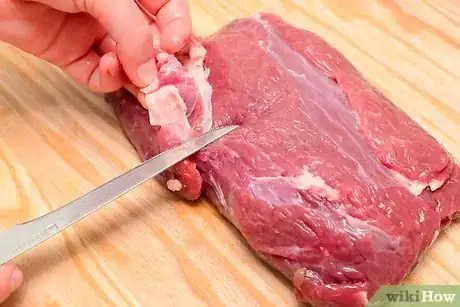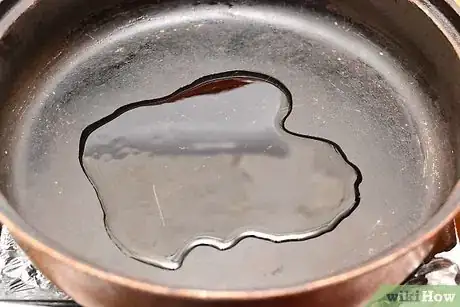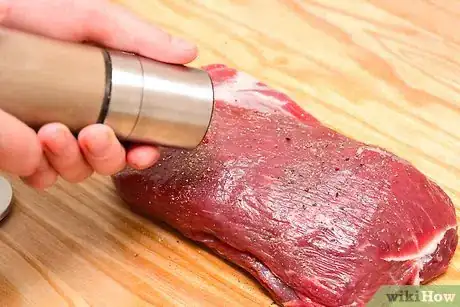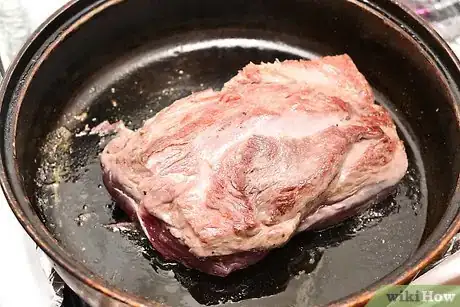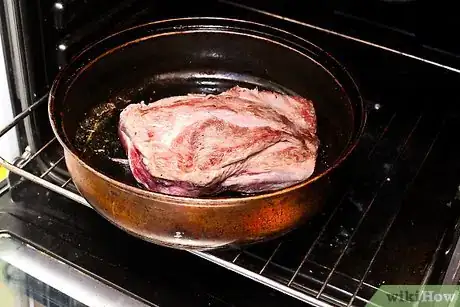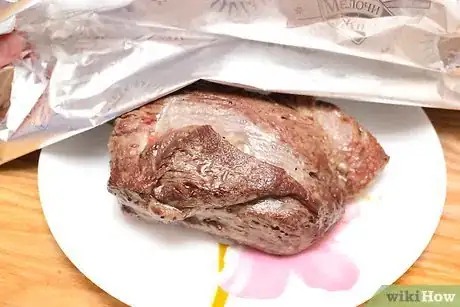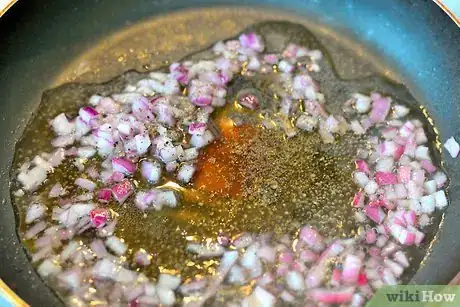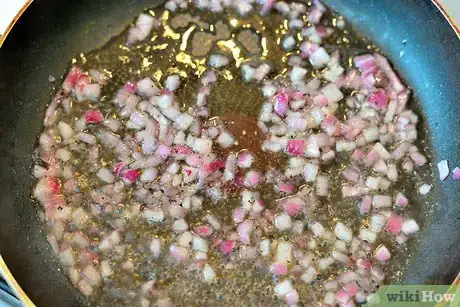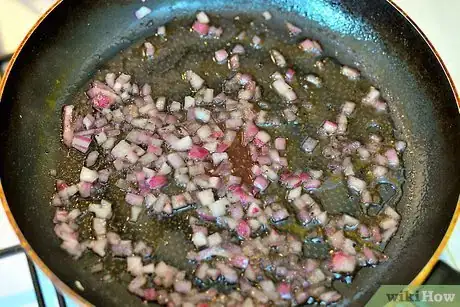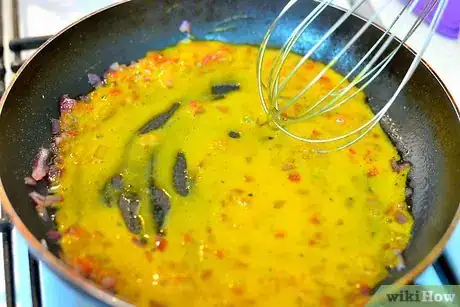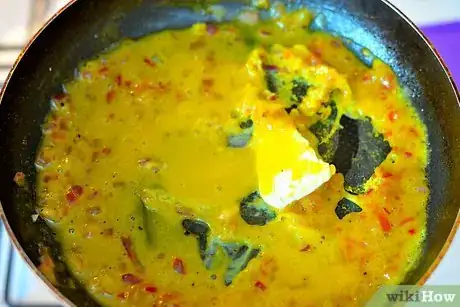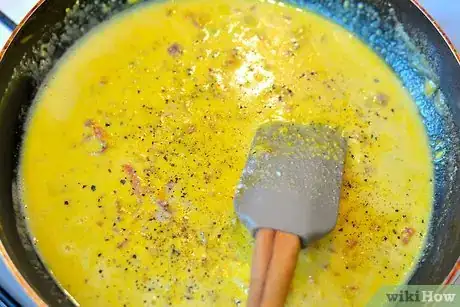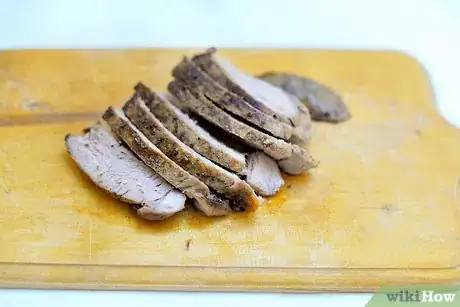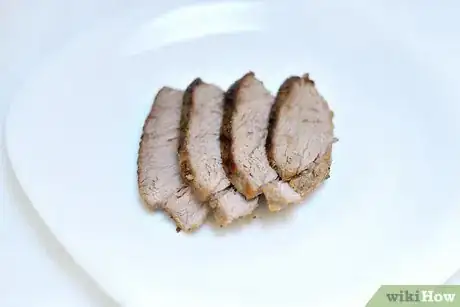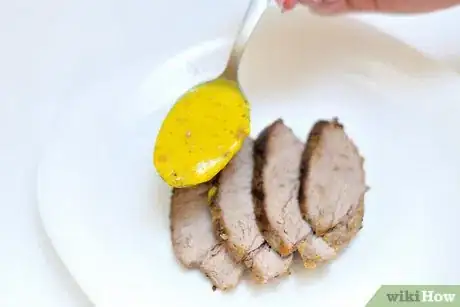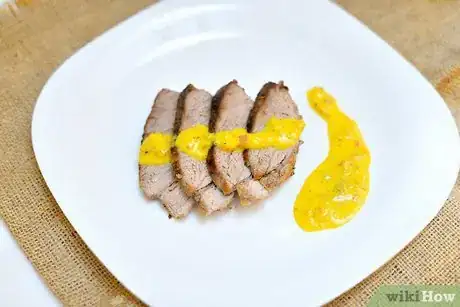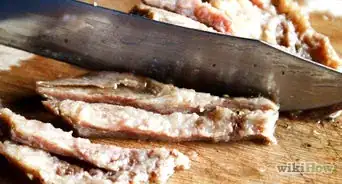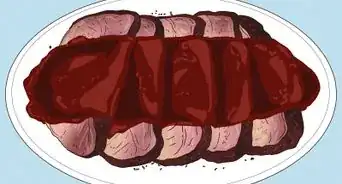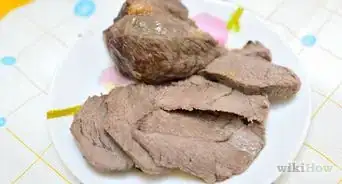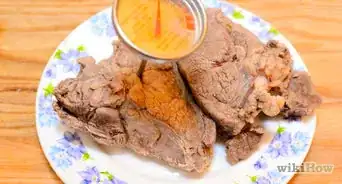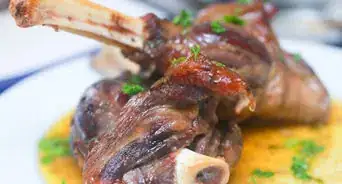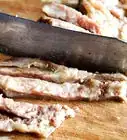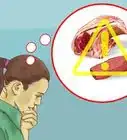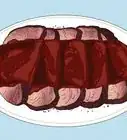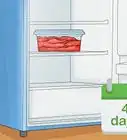This article was co-authored by wikiHow staff writer, Jessica Gibson. Jessica Gibson is a Writer and Editor who's been with wikiHow since 2014. After completing a year of art studies at the Emily Carr University in Vancouver, she graduated from Columbia College with a BA in History. Jessica also completed an MA in History from The University of Oregon in 2013.
This article has been viewed 186,559 times.
Learn more...
You don't need to go to a fancy French restaurant to have decadent chateaubriand. Trim 2 pieces of center-cut beef tenderloin and sear them over high heat on the stove or grill. Then transfer the tender meat to the oven where it will roast until it's medium or medium-rare. While the chateaubriand cooks, make classic béarnaise sauce using tarragon, white wine, shallots, and butter. Serve slices of the meat with the rich sauce and enjoy!
Ingredients
- 2 1 3⁄4 pounds (790 g) cuts of chateaubriand (center-cut beef tenderloin)
- 1 tablespoon (15 ml) olive oil
- 3 tablespoons (42 g) butter
Makes 4 servings
- 2 tablespoons (30 ml) tarragon vinegar
- 1⁄4 cup (59 ml) white wine
- 1 teaspoon (2.5 g) coarsely crushed peppercorns
- 1 small shallot, finely diced
- 4 egg yolks
- 1⁄2 tablespoon (7.4 ml) fresh lemon juice
- 14 tablespoons (198.5 g) butter, softened
- 2 to 3 tablespoons (3 to 5 g) fresh tarragon leaves, minced
- Salt and freshly ground black pepper to taste
Makes 4 servings
Steps
Searing and Roasting the Meat
-
1Preheat the oven to 350 °F (177 °C) and trim the chateaubriand. Get out 2 1-3/4 pound pieces of chateaubriand and use a sharp paring knife to cut away the silverskin and visible fat. You may need to use your fingers to pull the silverskin away from the meat.[1]
- The silverskin is the silvery membrane on the surface of the meat. If you don't remove it, the membrane will make the meat tough.
-
2Heat the olive oil over high heat for 2 minutes. Pour 1 tablespoon (15 ml) of olive oil into a large, oven-safe grill pan or skillet and turn the burner to high. Heat the oil until it becomes hot and shimmery.[2]
- Avoid using extra-virgin olive oil because it has a lower smoke point and will burn.
- If you prefer, you can sear the chateaubriand on a charcoal or gas grill instead of on the stove top.
Advertisement -
3Season the chateaubriand and sear it for 3 to 4 minutes. Right before you're ready to sear the meat, sprinkle salt and pepper to taste over each side of the chateaubriand. Immediately lower both pieces of meat into the hot grill pan or skillet. Let the meat sear without moving them so they brown evenly.[3]
- The chateaubriand should sizzle as soon as you place it in the pan. If it doesn't, you grill pan needs to be hotter.
-
4Turn the meat and sear it in butter for 3 to 4 more minutes. Use tongs to flip the chateaubriand over and add the butter to the grill pan. Sear the meat until it's browned on all sides and then turn off the burner.[4]
- If you like, you can carefully spoon hot butter over the meat as it sears.
-
5Transfer the chateaubriand to the preheated oven. Put on an oven mitt and open the oven door. Put the grill pan with the seared chateaubriand in the center of your oven.[5]
-
6Roast the chateaubriand until it reaches 130 °F (54 °C) to 135 °F (57 °C). Insert an instant-read thermometer into the thickest part of the meat. Cook the chateaubriand to 130 °F (54 °C) for rare or 135 °F (57 °C) for medium-rare. You can begin checking the meat after roasting it for 15 to 20 minutes.[6]
- Keep in mind that the meat will continue to cook a little as it rests.
-
7Remove and rest the meat for 10 to 15 minutes. Wear oven mitts to remove the hot grill pan from the oven. Use tongs to move the chateaubriand onto a plate or cutting board and cover the meat loosely with aluminum foil. Let the meat rest so the juices redistribute within the meat.[7]
Cooking the Béarnaise Sauce
-
1Combine the vinegar with the white wine, peppercorns, and shallot. Pour the tarragon vinegar into a small saucepan and whisk in the white wine, coarsely crushed peppercorns, and 1 finely diced shallot.[8]
-
2Boil the liquid until it's reduced by half. Turn the burner to high so the liquid comes to a rolling boil. Keep boiling the mixture and whisk it occasionally until half of the liquid evaporates.[9]
- Keep an eye on the mixture because it reduce within a few minutes.
-
3Cool the reduction for 1 minute. Turn off the burner and let the reduction cool a little before you whisk in the remaining sauce ingredients. If you add the remaining ingredients while the reduction is very hot, the sauce could curdle.[10]
-
4Whisk in 4 eggs and the lemon juice. Put the saucepan back on the burner and turn the heat to medium-low. Whisk in the eggs 1 at a time and then the fresh lemon juice. The sauce should be thin and combined.[11]
-
5Whisk in the butter and allow the sauce to thicken. Whisk in 3 tablespoons (42 g) of the softened butter until it melts and incorporates into the sauce. Continue to whisk in the rest of the softened butter 3 tablespoons (42 g) at a time until it's slowly combined with the sauce. The sauce will thicken as you whisk.[12]
-
6Turn off the burner and stir in salt, pepper, and tarragon. Once the sauce is thick enough to stick to the whisk, turn off the burner and whisk in salt and pepper according to your taste. You'll also need to whisk in 2 to 3 tablespoons (3 to 5 g) of fresh minced tarragon leaves.[13]
- If the sauce isn't as thick as you'd like it, continue to cook it over low heat for 1 to 2 minutes.
Serving the Chateaubriand
-
1Slice the chateaubriand. Use a sharp carving knife to cut the meat into 1⁄2 inch (1.3 cm)-thick slices. To ensure tender slices, remember to cut against the grain.[14]
-
2Plate the slices of meat. Divide the chateaubriand slices among 4 serving plates. If you prefer to let your guests serve themselves, set the meat on a serving platter in the center of the table.[15]
- Store leftover chateaubriand in an airtight container in the refrigerator for 3 to 5 days.
-
3Spoon the béarnaise sauce over the meat. Use a ladle to spoon sauce directly on the slices of meat. Do this just before you serve the meat, so the sauce stays warm.[16]
-
4Set out a bowl of béarnaise sauce on the table. Fill a gravy boat or sauce dish with the rest of the béarnaise sauce and place it near the meat. Your guests can help themselves to more sauce, if they need it.[17]
- Béarnaise sauce should be used soon after it's made. Avoid storing leftover sauce because it will separate and congeal.
Community Q&A
Did you know you can get answers researched by wikiHow Staff?
Unlock staff-researched answers by supporting wikiHow
-
QuestionIs chateaubriand the same as filet mignon?
 wikiHow Staff EditorThis answer was written by one of our trained team of researchers who validated it for accuracy and comprehensiveness.
wikiHow Staff EditorThis answer was written by one of our trained team of researchers who validated it for accuracy and comprehensiveness.
Staff Answer wikiHow Staff EditorStaff Answer
wikiHow Staff EditorStaff Answer -
QuestionCan chateaubriand be cooked well-done?
 wikiHow Staff EditorThis answer was written by one of our trained team of researchers who validated it for accuracy and comprehensiveness.
wikiHow Staff EditorThis answer was written by one of our trained team of researchers who validated it for accuracy and comprehensiveness.
Staff Answer wikiHow Staff EditorStaff Answer
wikiHow Staff EditorStaff Answer -
QuestionWhat does chateaubriand mean in English?
 wikiHow Staff EditorThis answer was written by one of our trained team of researchers who validated it for accuracy and comprehensiveness.
wikiHow Staff EditorThis answer was written by one of our trained team of researchers who validated it for accuracy and comprehensiveness.
Staff Answer wikiHow Staff EditorStaff Answer
wikiHow Staff EditorStaff Answer
Things You'll Need
Searing and Roasting the Meat
- Paring knife
- Large, oven-safe grill pan or skillet
- Tongs
- Oven mitts
- Instant-read thermometer
- Cutting board
- Aluminum foil
Cooking the Béarnaise Sauce
- Measuring cups and spoons
- Whisk
- Small saucepan
Serving the Chateaubriand
- Knife and cutting board
- Ladle
- Gravy boat or sauce dish
- Serving plates
References
- ↑ http://www.foodnetwork.com/recipes/tyler-florence/roasted-chateaubriand-with-red-wine-mushroom-reduction-and-pomme-puree-2693233
- ↑ http://www.foodnetwork.com/recipes/tyler-florence/roasted-chateaubriand-with-red-wine-mushroom-reduction-and-pomme-puree-2693233
- ↑ http://www.foodnetwork.com/recipes/tyler-florence/roasted-chateaubriand-with-red-wine-mushroom-reduction-and-pomme-puree-2693233
- ↑ http://www.foodnetwork.com/recipes/tyler-florence/roasted-chateaubriand-with-red-wine-mushroom-reduction-and-pomme-puree-2693233
- ↑ http://www.foodnetwork.com/recipes/tyler-florence/roasted-chateaubriand-with-red-wine-mushroom-reduction-and-pomme-puree-2693233
- ↑ http://www.foodnetwork.com/recipes/tyler-florence/roasted-chateaubriand-with-red-wine-mushroom-reduction-and-pomme-puree-2693233
- ↑ http://www.foodnetwork.com/recipes/tyler-florence/roasted-chateaubriand-with-red-wine-mushroom-reduction-and-pomme-puree-2693233
- ↑ https://www.bbc.co.uk/food/recipes/chateaubriand_with_80496
- ↑ https://www.bbc.co.uk/food/recipes/chateaubriand_with_80496
- ↑ https://www.bbc.co.uk/food/recipes/chateaubriand_with_80496
- ↑ https://www.bbc.co.uk/food/recipes/chateaubriand_with_80496
- ↑ https://www.bbc.co.uk/food/recipes/chateaubriand_with_80496
- ↑ https://www.bbc.co.uk/food/recipes/chateaubriand_with_80496
- ↑ http://www.foodnetwork.com/recipes/tyler-florence/roasted-chateaubriand-with-red-wine-mushroom-reduction-and-pomme-puree-2693233
- ↑ https://www.bbc.co.uk/food/recipes/chateaubriand_with_80496
- ↑ https://www.bbc.co.uk/food/recipes/chateaubriand_with_80496
- ↑ https://www.bbc.co.uk/food/recipes/chateaubriand_with_80496
About This Article
To cook chateaubriand, start by trimming the fat off the meat with a knife. Then, sear the chateaubriand for a few minutes on each side. Once you've seared both sides of the meat, roast it in the oven at 350 °F for 15-20 minutes or until the chateaubriand reaches 135 °F. When the chateaubriand is finished, let it rest for 10 minutes before serving. For help making a classic Béarnaise sauce for your Chateaubriand, scroll down!
